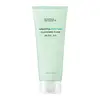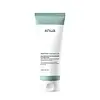What's inside
What's inside
 Key Ingredients
Key Ingredients

 Benefits
Benefits

 Concerns
Concerns

 Ingredients Side-by-side
Ingredients Side-by-side

Water
Skin ConditioningCamellia Sinensis Leaf Water 10%
MaskingDisodium Cocoamphodiacetate
CleansingSodium Cocoyl Alaninate
Sodium Methyl Cocoyl Taurate
CleansingAcrylates/C10-30 Alkyl Acrylate Crosspolymer
Emulsion StabilisingSodium Chloride
MaskingGlycerin
HumectantMethylpropanediol
SolventDisodium 2-Sulfolaurate
CleansingCamellia Sinensis Leaf Extract 0.1%
AntimicrobialLactobacillus/Rye Flour Ferment
Skin ConditioningLactobacillus/Soymilk Ferment Filtrate
Skin ConditioningBacillus/Soybean Ferment Extract
Skin ConditioningCarica Papaya Fruit Extract
Skin ConditioningCitrus Aurantium Bergamia Fruit Oil
MaskingLavandula Angustifolia Oil
MaskingQuillaja Saponaria Bark Extract
CleansingLauryl Hydroxysultaine
Cleansing1,2-Hexanediol
Skin ConditioningCaprylyl Glycol
EmollientCoco-Glucoside
CleansingTromethamine
BufferingSodium Cocoyl Isethionate
CleansingSodium Citrate
BufferingStyrene/Acrylates Copolymer
Hexylene Glycol
EmulsifyingSodium Myristoyl Glutamate
CleansingCitric Acid
BufferingButylene Glycol
HumectantCeramide NP
Skin ConditioningPropanediol
SolventNiacinamide
SmoothingFolic Acid
Skin ConditioningPantothenic Acid
Skin ConditioningPyridoxine
Skin ConditioningThiamine Hcl
MaskingCyanocobalamin
Skin ConditioningRiboflavin
Cosmetic ColorantXanthan Gum
EmulsifyingLimonene
PerfumingLinalool
PerfumingWater, Camellia Sinensis Leaf Water 10%, Disodium Cocoamphodiacetate, Sodium Cocoyl Alaninate, Sodium Methyl Cocoyl Taurate, Acrylates/C10-30 Alkyl Acrylate Crosspolymer, Sodium Chloride, Glycerin, Methylpropanediol, Disodium 2-Sulfolaurate, Camellia Sinensis Leaf Extract 0.1%, Lactobacillus/Rye Flour Ferment, Lactobacillus/Soymilk Ferment Filtrate, Bacillus/Soybean Ferment Extract, Carica Papaya Fruit Extract, Citrus Aurantium Bergamia Fruit Oil, Lavandula Angustifolia Oil, Quillaja Saponaria Bark Extract, Lauryl Hydroxysultaine, 1,2-Hexanediol, Caprylyl Glycol, Coco-Glucoside, Tromethamine, Sodium Cocoyl Isethionate, Sodium Citrate, Styrene/Acrylates Copolymer, Hexylene Glycol, Sodium Myristoyl Glutamate, Citric Acid, Butylene Glycol, Ceramide NP, Propanediol, Niacinamide, Folic Acid, Pantothenic Acid, Pyridoxine, Thiamine Hcl, Cyanocobalamin, Riboflavin, Xanthan Gum, Limonene, Linalool
Water
Skin ConditioningDisodium Cocoamphodiacetate
CleansingSodium Cocoyl Alaninate
Sodium Methyl Cocoyl Taurate
CleansingAcrylates/C10-30 Alkyl Acrylate Crosspolymer
Emulsion StabilisingDisodium 2-Sulfolaurate
CleansingSodium Chloride
MaskingGlycerin
HumectantMethylpropanediol
SolventHouttuynia Cordata Flower/Leaf/Stem Water
AntimicrobialHouttuynia Cordata Extract
Skin ConditioningQuillaja Saponaria Bark Extract
CleansingVincetoxicum Atratum Extract
Skin ConditioningAlthaea Rosea Flower Extract
Skin ConditioningChitosan
1,2-Hexanediol
Skin ConditioningCaprylyl Glycol
EmollientTromethamine
BufferingCoco-Glucoside
CleansingPanthenol
Skin ConditioningSalicylic Acid
MaskingSuccinic Acid
BufferingLauryl Hydroxysultaine
CleansingPolyglyceryl-4 Caprate
EmulsifyingEthylhexylglycerin
Skin ConditioningSodium Cocoyl Isethionate
CleansingSodium Citrate
BufferingSodium Phytate
Hexylene Glycol
EmulsifyingButylene Glycol
HumectantCitric Acid
BufferingProtease
ExfoliatingCaprylic/Capric Triglyceride
MaskingHydrogenated Lecithin
EmulsifyingTocopherol
AntioxidantCeramide NP
Skin ConditioningDipropylene Glycol
HumectantPentylene Glycol
Skin ConditioningCholesterol
EmollientParfum
MaskingWater, Disodium Cocoamphodiacetate, Sodium Cocoyl Alaninate, Sodium Methyl Cocoyl Taurate, Acrylates/C10-30 Alkyl Acrylate Crosspolymer, Disodium 2-Sulfolaurate, Sodium Chloride, Glycerin, Methylpropanediol, Houttuynia Cordata Flower/Leaf/Stem Water, Houttuynia Cordata Extract, Quillaja Saponaria Bark Extract, Vincetoxicum Atratum Extract, Althaea Rosea Flower Extract, Chitosan, 1,2-Hexanediol, Caprylyl Glycol, Tromethamine, Coco-Glucoside, Panthenol, Salicylic Acid, Succinic Acid, Lauryl Hydroxysultaine, Polyglyceryl-4 Caprate, Ethylhexylglycerin, Sodium Cocoyl Isethionate, Sodium Citrate, Sodium Phytate, Hexylene Glycol, Butylene Glycol, Citric Acid, Protease, Caprylic/Capric Triglyceride, Hydrogenated Lecithin, Tocopherol, Ceramide NP, Dipropylene Glycol, Pentylene Glycol, Cholesterol, Parfum
Ingredients Explained
These ingredients are found in both products.
Ingredients higher up in an ingredient list are typically present in a larger amount.
1,2-Hexanediol is a synthetic liquid and another multi-functional powerhouse.
It is a:
- Humectant, drawing moisture into the skin
- Emollient, helping to soften skin
- Solvent, dispersing and stabilizing formulas
- Preservative booster, enhancing the antimicrobial activity of other preservatives
Acrylates/C10-30 Alkyl Acrylate Crosspolymer is a synthetic polymer. It is used to thicken and improve the texture of products. Due to its properties, it can prevent water and oil ingredients from separating.
Butylene Glycol (or BG) is used within cosmetic products for a few different reasons:
Overall, Butylene Glycol is a safe and well-rounded ingredient that works well with other ingredients.
Though this ingredient works well with most skin types, some people with sensitive skin may experience a reaction such as allergic rashes, closed comedones, or itchiness.
Learn more about Butylene GlycolCaprylyl Glycol is a humectant and emollient, meaning it attracts and preserves moisture.
It is a common ingredient in many products, especially those designed to hydrate skin. The primary benefits are retaining moisture, skin softening, and promoting a healthy skin barrier.
Though Caprylyl Glycol is an alcohol derived from fatty acids, it is not the kind that can dry out skin.
This ingredient is also used as a preservative to extend the life of products. It has slight antimicrobial properties.
Learn more about Caprylyl GlycolCeramide NP is a type of ceramide and formally known as ceramide 3.
Ceramides are intercellular lipids naturally found in our skin that bonds dead skin cells together to create a barrier. They are known for their ability to hold water and thus are a great ingredient for dry skin.
Ceramides are an important building block for our skin barrier. A stronger barrier helps the skin look more firm and hydrated. By bolstering the skin ceramides act as a barrier against irritating ingredients. This can help with inflammation as well.
If you would like to eat ceramides, sweet potatoes contain a small amount.
Read more about other common types of ceramides here:
Ceramide AP
Ceramide EOP
Citric Acid is an alpha hydroxy acid (AHA) naturally found in citrus fruits like oranges, lemons, and limes.
Like other AHAs, citric acid can exfoliate skin by breaking down the bonds that hold dead skin cells together. This helps reveal smoother and brighter skin underneath.
However, this exfoliating effect only happens at high concentrations (20%) which can be hard to find in cosmetic products.
Due to this, citric acid is usually included in small amounts as a pH adjuster. This helps keep products slightly more acidic and compatible with skin's natural pH.
In skincare formulas, citric acid can:
While it can provide some skin benefits, research shows lactic acid and glycolic acid are generally more effective and less irritating exfoliants.
Most citric acid used in skincare today is made by fermenting sugars (usually from molasses). This synthetic version is identical to the natural citrus form but easier to stabilize and use in formulations.
Read more about some other popular AHA's here:
Learn more about Citric AcidCoco-Glucoside is a surfactant, or a cleansing ingredient. It is made from glucose and coconut oil.
Surfactants help gather dirt, oil, and other pollutants from your skin to be rinsed away.
This ingredient is considered gentle and non-comedogenic. However, it may still be irritating for some.
Learn more about Coco-GlucosideWe don't have a description for Disodium 2-Sulfolaurate yet.
Disodium Cocoamphodiacetate is a surfactant and helps cleanse skin. It is created from the fatty acids of coconut oil.
Surfactants help rinse oil, dirt, and other pollutants easily from skin. It has a faint fruit-like scent.
Glycerin is already naturally found in your skin. It helps moisturize and protect your skin.
A study from 2016 found glycerin to be more effective as a humectant than AHAs and hyaluronic acid.
As a humectant, it helps the skin stay hydrated by pulling moisture to your skin. The low molecular weight of glycerin allows it to pull moisture into the deeper layers of your skin.
Hydrated skin improves your skin barrier; Your skin barrier helps protect against irritants and bacteria.
Glycerin has also been found to have antimicrobial and antiviral properties. Due to these properties, glycerin is often used in wound and burn treatments.
In cosmetics, glycerin is usually derived from plants such as soybean or palm. However, it can also be sourced from animals, such as tallow or animal fat.
This ingredient is organic, colorless, odorless, and non-toxic.
Glycerin is the name for this ingredient in American English. British English uses Glycerol/Glycerine.
Learn more about GlycerinHexylene Glycol is a surfactant. Glycols are a class of alcohols. Hexylene Glycol is a surfactant and emulsifier.
As a surfactant, Hexylene Glycol helps gather dirt and oil on your skin to be washed away.
As an emulsifier, Hexylene Glycol helps keep water and oil together. This prevents them from separating in a product. Hexylene Glycol also thins out the texture of a product by lessening viscosity.
Hexylene Glycol has a small molecular weight.
Learn more about Hexylene GlycolWe don't have a description for Lauryl Hydroxysultaine yet.
Methylpropanediol is a synthetic solvent and humectant.
As a solvent, it helps dissolve other ingredients, helping to evenly distribute ingredients throughout the product. This ingredient has also been shown to have antimicrobial properties which makes it a preservative booster.
Methylpropanediol is able to add a bit of moisture to the skin. It also helps other ingredients be better absorbed into the skin, such as salicylic acid.
Learn more about MethylpropanediolWe don't have a description for Quillaja Saponaria Bark Extract yet.
Chances are, you eat sodium chloride every day. Sodium Chloride is also known as table salt.
This ingredient has many purposes in skincare: thickener, emulsifier, and exfoliator.
You'll most likely find this ingredient in cleansers where it is used to create a gel-like texture. As an emulsifier, it also prevents ingredients from separating.
There is much debate on whether this ingredient is comedogenic. The short answer - comedogenic ratings don't tell the whole story. Learn more about comegodenic ratings here.
The concensus about this ingredient causing acne seems to be divided. Research is needed to understand if this ingredient does cause acne.
Scrubs may use salt as the primary exfoliating ingredient.
Learn more about Sodium ChlorideSodium Citrate is the sodium salts of citric acid. In skincare, it is used to alter pH levels and acts as a preservative.
Its main functions are to maintain the pH of a product and neutralize metal ions.
The acidity of our skin is maintained by our glands and skin biome; normal pH level of skin is slightly acidic (~4.75-5.5).
Being slightly acidic allows our skin to create an "acid mantle". This acid mantle is a thin barrier that protects our skin from bacteria and contaminants.
Learn more about Sodium CitrateThis ingredient is a surfactant and foam producer.
Sodium cocoyl isethionate is a natural ingredient from coconut oil. It is an ultra gentle cleanser that gives a nice foam without drying the skin or impacting the skin barrier.
The amount of foam created depends on the amount of sodium cocoyl isethionate used in the product.
This ingredient also helps improve the spreadability of a product.
Learn more about Sodium Cocoyl IsethionateThis gentle cleansing and foaming ingredient is known for leaving a smooth feeling in skin and hair. It is made using coconut oil.
According to the manufacturer, it is soluble in water and has resistance to hard water, acid, and alkali.
Due to its coconut base, it may not be Malassezia folliculitis safe.
Learn more about Sodium Methyl Cocoyl TaurateTromethamine helps balance the pH and improve the texture of a product. It is synthetically created.
As an emulsifier, Tromethamine prevents oil and water ingredients from separating. This helps stabilize the product and elongate a product's shelf life. Tromethamine also makes a product thicker.
Tromethamine helps balance the pH level of a product. Normal pH level of skin is slightly acidic (~4.75-5.5). The acidity of our skin is maintained by our glands and skin biome. Being slightly acidic allows our skin to create an "acid mantle". This acid mantle is a thin barrier that protects our skin from bacteria and contaminants.
Oral Tromethanmine is an anti-inflammatory drug but plays the role of masking, adding fragrance, and/or balancing pH in skincare.
1,3-Propanediol, 2-amino-2-(hydroxymethyl)-
Learn more about TromethamineWater. It's the most common cosmetic ingredient of all. You'll usually see it at the top of ingredient lists, meaning that it makes up the largest part of the product.
So why is it so popular? Water most often acts as a solvent - this means that it helps dissolve other ingredients into the formulation.
You'll also recognize water as that liquid we all need to stay alive. If you see this, drink a glass of water. Stay hydrated!
Learn more about Water